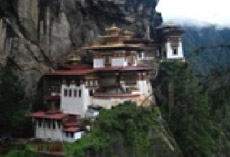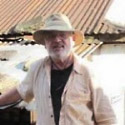Don Messerschmidt (Nepal 1963-65) Makes You An Offer You Can't Refuse
•
Bhutan: Going to the Dogs Trek and Festival
Be assured, this new 2014 trip is not all trek. Between our arrival in Bhutan on March 29 and departure on April 12, there is a total of 6 days on a moderate mountain trek (highest elevation is something around 13,500 feet, over and down in one day). the trek is scheduled for early in the trip, in Tashigang District, in the far Northeast corner of the country. The rest of the trip is an eco-tour of Bhutan, through the hills and mountains on the “Royal Road” from east Bhutan west to the capital, Thimphu, and ending at Paro (the airport town). It includes a drive through some amazing forests, high and low; a brief visit to beautiful Bumthang and Punakha valleys, sight-seeing in Thimphu, a day-long hiking excursion to  “The Tiger’s Nest” — the amazing cliffside Taktsang Monastery (near Paro), and a ‘tsechu’ religious (Buddhist) dance drama festival (in Paro).
“The Tiger’s Nest” — the amazing cliffside Taktsang Monastery (near Paro), and a ‘tsechu’ religious (Buddhist) dance drama festival (in Paro).
Nor is the trip all about dogs. Several travelers for 2014 have indicated an interest in seeing the fabled Tibetan mastiff livestock (yak) guardian dogs, so we’ve planned the trek to take us into the high valleys of Sakteng and Merak, the home of exotic yak herders, forest and pasture dwellers, who have some fine dogs: Tibetan mastiffs.
But besides that (and for all of the trip), we’ll also see exotic birds and wildlife, and view some spell-binding scenery. March and April is rhododendron season. Bhutan has over 40 varieties, and we’ll see many of them on this trip… whole mountainsides of rhododendrons in blossom as well as oak, fir, larch, cedar and other forest types. We’ll also met Bhutanese farmers and herders, and Buddhist monks and nuns, children and elders, and we’ll tour several dzongs — typically a combination of district administrative centers and monastic communities housed together in historic, centuries-old large fortress-like structures carefully situated for protection and security from ‘enemies’ (of the past).
Throughout the trip, the photography is spectacular, so you’ll want to bring your digital camera(s) + ample media cards and one or more spare batteries + battery charger. We’ll have electricity and will be able to charge batteries almost every evening (except for a few times on trek).
On trek, our accommodations will be tented camps, with a team of Bhutanese managing the cooking and supplies, and ponies to carry our gear.
You’ll carry only a light day-pack. Your physical fitness is important, of course. If you have questions about the trek difficulty vis-a-vis your abilities, be sure to ask. The trek is ‘moderate’ with lots of up hills and down, and (as noted above) one high point. We did the same trek last April, and everyone did very well with no serious problems.
On the cross-country tour, we’ll stay in some great resort hotels, inns and guesthouses. And, we can easily accommodate any food restrictions or preferences that you might have.
The trip begins in eastern Bhutan on March 29th, 2014. All timing and how to get to the starting point is covered in the online itinerary.
We hope to accommodate at least 10 people on this trip, so spread the word to any and all friends who might be interested.
Questions? Contact me at dmesserschmidt@gmail.com or our international agent, Rusty Brennan of Ri Adventure Travel, at rusty@rustytraveler.com.
Or check out: riadventuretravel.com/assets/pdf/2014_Bhutan_Going_to_the_Dogs_Day_6_FINAL_Itin.pdf
Cheers, caio, and Kunzo Zangpo-la! [typical Bhutanese greeting]
and remember “Happiness is a Place” (a Bhutanese motto)!
•
 Dr Don Messerschmidt is an anthropologist, writer, and an international development consultant. He was born in Alaska, and graduated from the University of Alaska in 1963. Shortly thereafter he first went to Nepal as a Peace Corps Volunteer working in rural development. He then stayed on in Nepal, where he lived off and on for many of the last 50 years as a teacher, rural development consultant, researcher and writer. In 1973 he was awarded a PhD in Anthropology from the University of Oregon. He has taught in both American and Nepalese universities, and has worked on numerous international development projects as a social scientist – in community forestry, social impact assessment on hydropower projects, public health, and irrigation.
Dr Don Messerschmidt is an anthropologist, writer, and an international development consultant. He was born in Alaska, and graduated from the University of Alaska in 1963. Shortly thereafter he first went to Nepal as a Peace Corps Volunteer working in rural development. He then stayed on in Nepal, where he lived off and on for many of the last 50 years as a teacher, rural development consultant, researcher and writer. In 1973 he was awarded a PhD in Anthropology from the University of Oregon. He has taught in both American and Nepalese universities, and has worked on numerous international development projects as a social scientist – in community forestry, social impact assessment on hydropower projects, public health, and irrigation.
He is also the author of several books on Nepal, and many magazine articles, and in ‘retirement’ he leads treks and tours in the Himalayan states of Nepal and Bhutan. When not roaming the Himalayas he lives in Vancouver, Washington with his wife Kareen, and near their adult son and daughter.
No comments yet.
Add your comment